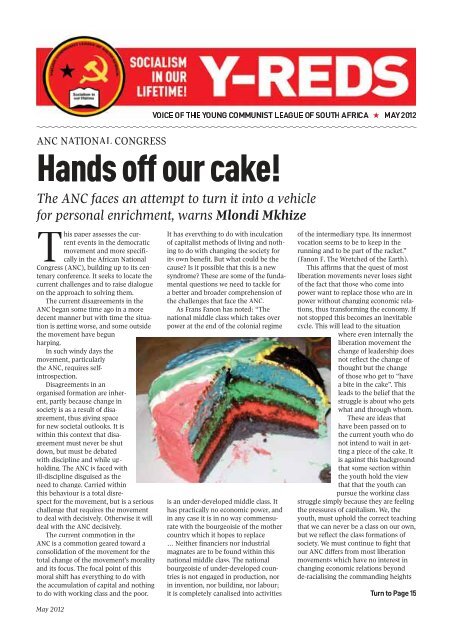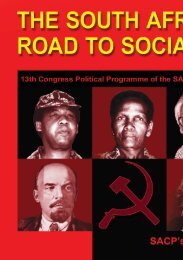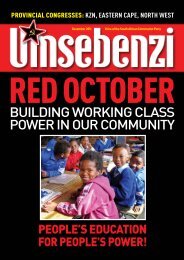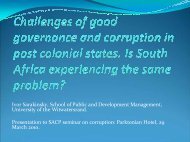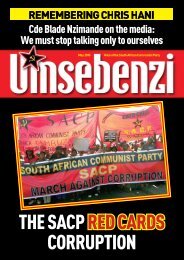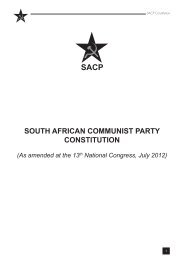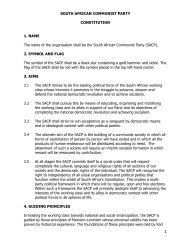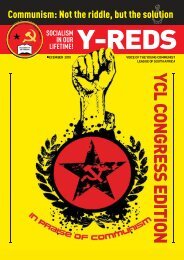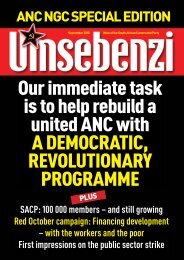A sea of red - South African Communist Party
A sea of red - South African Communist Party
A sea of red - South African Communist Party
Create successful ePaper yourself
Turn your PDF publications into a flip-book with our unique Google optimized e-Paper software.
ANC NATION<br />
AL CONGRESS<br />
Hands <strong>of</strong>f our cake!<br />
The ANC faces an attempt to turn it into a vehicle<br />
for personal enrichment, warns Mlondi Mkhize<br />
This paper assesses the current<br />
events in the democratic<br />
movement and more specifically<br />
in the <strong>African</strong> National<br />
Congress (ANC), building up to its centenary<br />
conference. It seeks to locate the<br />
current challenges and to raise dialogue<br />
on the approach to solving them.<br />
The current disagreements in the<br />
ANC began some time ago in a more<br />
decent manner but with time the situation<br />
is getting worse, and some outside<br />
the movement have begun<br />
harping.<br />
In such windy days the<br />
movement, particularly<br />
the ANC, requires selfintrospection.<br />
Disagreements in an<br />
organised formation are inherent,<br />
partly because change in<br />
society is as a result <strong>of</strong> disagreement,<br />
thus giving space<br />
for new societal outlooks. It is<br />
within this context that disagreement<br />
must never be shut<br />
down, but must be debated<br />
with discipline and while upholding.<br />
The ANC is faced with<br />
ill-discipline disguised as the<br />
need to change. Carried within<br />
this behaviour is a total disrespect<br />
for the movement, but is a serious<br />
challenge that requires the movement<br />
to deal with decisively. Otherwise it will<br />
deal with the ANC decisively.<br />
The current commotion in the<br />
ANC is a commotion gea<strong>red</strong> toward a<br />
consolidation <strong>of</strong> the movement for the<br />
total change <strong>of</strong> the movement’s morality<br />
and its focus. The focal point <strong>of</strong> this<br />
moral shift has everything to do with<br />
the accumulation <strong>of</strong> capital and nothing<br />
to do with working class and the poor.<br />
May 2012<br />
It has everything to do with inculcation<br />
<strong>of</strong> capitalist methods <strong>of</strong> living and nothing<br />
to do with changing the society for<br />
its own benefit. But what could be the<br />
cause? Is it possible that this is a new<br />
syndrome? These are some <strong>of</strong> the fundamental<br />
questions we need to tackle for<br />
a better and broader comprehension <strong>of</strong><br />
the challenges that face the ANC.<br />
As Frans Fanon has noted: “The<br />
national middle class which takes over<br />
power at the end <strong>of</strong> the colonial regime<br />
is an under-developed middle class. It<br />
has practically no economic power, and<br />
in any case it is in no way commensurate<br />
with the bourgeoisie <strong>of</strong> the mother<br />
country which it hopes to replace<br />
… Neither financiers nor industrial<br />
magnates are to be found within this<br />
national middle class. The national<br />
bourgeoisie <strong>of</strong> under-developed countries<br />
is not engaged in production, nor<br />
in invention, nor building, nor labour;<br />
it is completely canalised into activities<br />
<strong>of</strong> the intermediary type. Its innermost<br />
vocation seems to be to keep in the<br />
running and to be part <strong>of</strong> the racket.”<br />
(Fanon F, The Wretched <strong>of</strong> the Earth).<br />
This affirms that the quest <strong>of</strong> most<br />
liberation movements never loses sight<br />
<strong>of</strong> the fact that those who come into<br />
power want to replace those who are in<br />
power without changing economic relations,<br />
thus transforming the economy. If<br />
not stopped this becomes an inevitable<br />
cycle. This will lead to the situation<br />
where even internally the<br />
liberation movement the<br />
change <strong>of</strong> leadership does<br />
not reflect the change <strong>of</strong><br />
thought but the change<br />
<strong>of</strong> those who get to “have<br />
a bite in the cake”. This<br />
leads to the belief that the<br />
struggle is about who gets<br />
what and through whom.<br />
These are ideas that<br />
have been passed on to<br />
the current youth who do<br />
not intend to wait in getting<br />
a piece <strong>of</strong> the cake. It<br />
is against this background<br />
that some section within<br />
the youth hold the view<br />
that that the youth can<br />
pursue the working class<br />
struggle simply because they are feeling<br />
the pressures <strong>of</strong> capitalism. We, the<br />
youth, must uphold the correct teaching<br />
that we can never be a class on our own,<br />
but we reflect the class formations <strong>of</strong><br />
society. We must continue to fight that<br />
our ANC differs from most liberation<br />
movements which have no interest in<br />
changing economic relations beyond<br />
de-racialising the commanding heights<br />
Turn to Page 15


